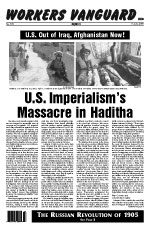
Cops, Corruption and the Imperial Presidency "War on Terror" Hits Congress On May 20, the FBI raided the Congressional office of Louisiana Democrat William Jefferson. The Feds’ aim was to seize evidence to buttress their ongoing investigation of his alleged bribe-taking from a small technology company in exchange for his influence. Given that this is the first such incursion in the 217 years since the forms of rule that constitute this country’s national government were established, it seems evident that the Bush administration sought this opportunity to further assert its right to do just about anything it pleases. Given the legions of crooks who inhabit Congress, it is hardly accidental that Bush’s Justice Department selected a black Democrat as the test case to see if this would “play in Peoria,” i.e., in racist America. In the aftermath, all hell broke loose as Congressmen—Republican and Democratic—led by Speaker of the House Dennis Hastert reviled the raid as an attack on the vaunted “separation of powers”—executive, legislative and judicial—that ensures the mythic purity of American democracy. Bush sealed the seized papers for 45 days in the hope that these branches of bourgeois rule can figure out a way to just get along. The House Judiciary Committee is staging hearings on the FBI raid, which prompted E.J. Dionne Jr. to quip in his Washington Post (2 June) column: “The Judiciary Committee is clearly concerned with the rights of 435 House members and—give them the benefit of the doubt—100 senators. Someday, the committee will get around to thinking about the rights of the remaining 296,409,869 of us.” A New York Times (26 May) editorial excoriated Congressmen who have “played dead when the executive branch refused to provide it with information, answer questions or follow laws that the legislative branch has passed.” The Times editors leave unmentioned their own cringing servility in parroting virtually every incredible tale—like Saddam Hussein’s non-existent “weapons of mass destruction”—offered by the Bush administration to support the invasion of Iraq. The outrage from Congressmen no doubt emanates in good part from the nightmarish possibility that their countless meetings with troops from the army of Jack Abramoffs bivouacked in Washington will be beamed directly from their Congressional offices to FBI headquarters (think Tom DeLay). But while we are not against the prosecution of thieves, this raid is a recent example of the administration’s efforts to use the powers it has accumulated to prosecute the “war on terror” to attack any of its perceived opponents. On May 23, a court decision freed four Connecticut librarians from a government-imposed gag that had forbidden them to reveal that the Feds had demanded lists of readers. And just last week, the chief spokesman for John Ashcroft when he was Attorney General accused Ashcroft’s successor, Alberto Gonzales, of a “reckless abuse of power” for issuing subpoenas calling for San Francisco Chronicle reporters covering steroid use in baseball to reveal their sources. Thus the spectre is raised that reporters might be criminally prosecuted for publishing such “classified information” as, say, Barry Bonds’ batting average. The “balance of powers” was designed in an effort to contain within one body politic the various competing regional and economic interests of the owners, large and small, whose property rights are the foundation of bourgeois rule. The holy aura emanating from this “principle” fades when one recalls that at the birth of the American state, these institutions and the sacred Constitution itself were “balanced” to ensure that chattel slavery would survive. The Mafia has evolved similar checks and balances, including a court of elders to resolve internecine disputes. The only difference is that those whose rule is based on wage slavery have deemed the activities of the capos illegal. But while this “balance of powers” is in the service of bourgeois rule, the working class, nevertheless, must oppose the accretion of power to the imperial presidency, an accretion that ultimately points to a police-state dictatorship. The Bush administration did not invent the proud presidential tradition of foisting lying representations onto the American people, although it is somewhat unusual in that it seemingly chooses only to lie. Nor is George W. Bush unique among presidents in his belief that executive power is absolute. Recall that during the Watergate hearings, Richard Nixon’s staff argued that the president had the right to commit robberies while admitting they had not researched the question of his right to commit murder. In the FBI’s COINTELPRO operation that resulted in the murder of 38 Black Panthers, the bourgeois state asserted its “right” to engage in assassination. What was different then is that both operations were covert by necessity, given the scope of the social struggles of that era. Today, Bush & Co. openly demand police-state powers. The contrived “war on terror” and the very real USA Patriot Act are used to buttress these demands, which have been acceded to by both wings of the “property party,” Democrats and Republicans alike. It is not news that the institutions of the U.S. bourgeois state are cesspools of corruption. But for the working class and oppressed minorities, the real danger resides in the machinery of violence that is at the heart of this state—the cops, armed forces, courts and prisons. The “democratic” trappings provided by the rulers are merely a cover for the capitalist state, whose purpose is to ensure the continued rule of the tiny class of exploiters. While the working people must fight to defend every shred of democratic rights and other gains, freedom from oppression and exploitation will only come through the smashing of the bourgeois state through socialist revolution.
|
|
||||||||||||||||||||||||||||||||||||||||||||||||||||||||||||
